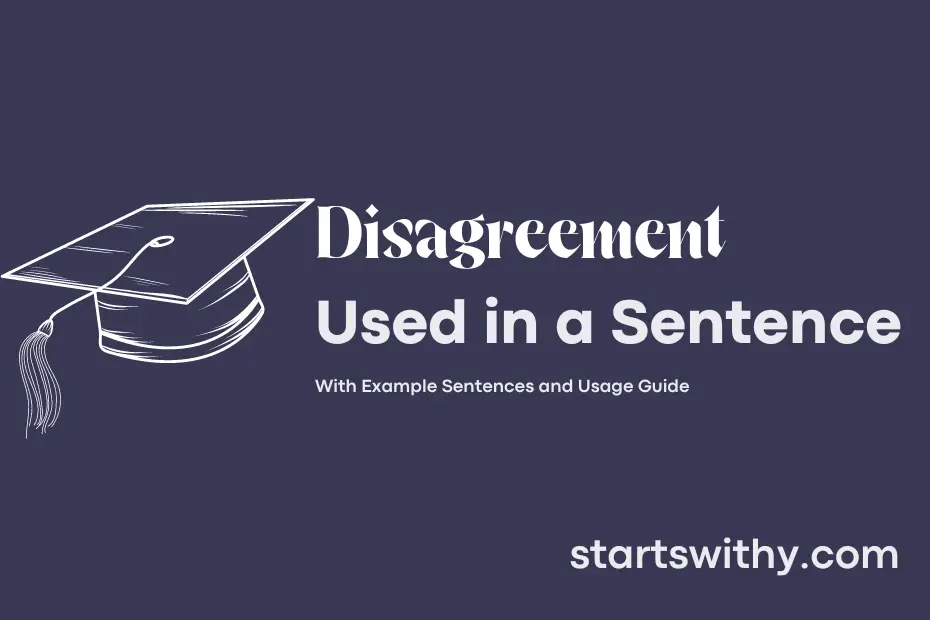When individuals express differing opinions or viewpoints, a disagreement arises. This occurs when there is a lack of consensus or agreement between two or more parties on a particular issue or topic.
Disagreements can stem from various factors such as differing beliefs, values, perspectives, or experiences. It is a common aspect of human interaction and can lead to healthy discussions, problem-solving, and growth when approached with open-mindedness and respect.
7 Examples Of Disagreement Used In a Sentence For Kids
- Riya and Ayaan had a disagreement about the color of the ball.
- Meera and Rohan disagreed on which game to play during recess.
- Aarav and Ananya had a disagreement over who gets to sit in the front row.
- Saanvi and Vivaan disagreed on what snacks to bring for the class party.
- Aanya and Aditya had a disagreement about the ending of the story they read.
- Kiara and Yash had a disagreement on which song to sing during the school assembly.
- Kabir and Rihaan disagreed on which animal was their favorite in the zoo.
14 Sentences with Disagreement Examples
- Disagreement between classmates on the best way to approach a group project can lead to tension.
- The student council members expressed their disagreement with the proposed changes to the college event calendar.
- Disagreement among roommates about the cleaning schedule can cause conflicts.
- There was a disagreement in the debate club meeting over the topic for the upcoming competition.
- The disagreement between the professors on the grading criteria for the final exam caused confusion among students.
- Disagreement between the two student organizations hindered collaboration on a charity event.
- The disagreement between friends about which movie to watch led to a lengthy discussion.
- Billy and Sarah had a disagreement about whether to volunteer for the same project or choose different ones.
- Disagreement between study partners on the best study techniques can impact their academic performance.
- The disagreement during the student council meeting about the budget allocation slowed down decision-making.
- Disagreement about the interpretation of a literary text in the English literature class sparked a lively debate.
- The disagreement between classmates on the best time to schedule a group study session caused delays in finalizing the plan.
- Disagreement among college friends over which restaurant to go to for dinner can result in indecision.
- The disagreement between research partners about the methodology to be used for their project delayed their progress.
How To Use Disagreement in Sentences?
To use the word “disagreement” in a sentence, first, identify a situation where there is a difference of opinion or lack of consensus on a particular topic. For example, “There was a disagreement among the group about which movie to watch.”
Next, determine the context in which the word “disagreement” fits best. It is commonly used to express a conflict or opposition in viewpoints, decisions, or beliefs. For instance, “The two friends had a disagreement about where to go for dinner.”
When constructing your sentence, place the word “disagreement” in a clear and concise manner within the sentence to convey the idea of conflicting opinions or ideas. It is important to ensure that the sentence structure is coherent and easy to understand. Here is another example: “The team encountered a disagreement over the best approach to completing the project.”
Remember to use proper punctuation and grammar in your sentence. This will help convey your message effectively and make it easier for others to understand your intended meaning. With practice, you’ll become more comfortable incorporating the word “disagreement” into your sentences to express differences of opinion or conflicting viewpoints.
Conclusion
In conclusion, sentences with disagreement are used to express a difference of opinion, contrasting viewpoints, or conflicting ideas. They serve to highlight divergent perspectives, spark discussions, and challenge assumptions. By using phrases such as “I disagree because,” “On the contrary,” or “However, I see things differently,” individuals can assert their dissent in a polite and constructive manner.
Through sentences with disagreement, communication becomes richer as varying viewpoints are presented and debated. It is important to remember that disagreement is a natural part of human interactions and can lead to deeper understanding, innovation, and growth. Embracing opposing viewpoints and engaging in respectful dialogue can foster critical thinking and broaden perspectives in a diverse and interconnected world.



